Hidden Dragon
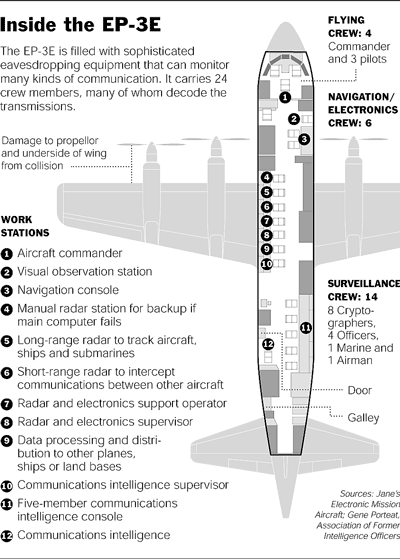 While I am writing this, China still holds 24 American spies as hostages in its ever more aggressive bid to establish a new cold war like bipolarity in the U.S. dominated world. Chinese media analysts scout the world’s media for articles that lean towards accepting their government’s demands for an American apology. Their reporters are sent to Pakistan, Jordan and Egypt to collect statements from ordinary people in the streets demanding American apology. China re-iterated its strong support for the U.N. - an organization that several consequent U.S. administrations saw as nuisance in the way of their foreign policy. Germany announced how China expressed its support for the Kyoto agreement on greenhouse gases reduction - thus leaving the U.S. as a sole large industrialized nation opposing it. Reduction of greenhouse gases would demand curbing energy use and that is perceived as a direct threat to the American way of life by the certain SUV-owning nation.
While I am writing this, China still holds 24 American spies as hostages in its ever more aggressive bid to establish a new cold war like bipolarity in the U.S. dominated world. Chinese media analysts scout the world’s media for articles that lean towards accepting their government’s demands for an American apology. Their reporters are sent to Pakistan, Jordan and Egypt to collect statements from ordinary people in the streets demanding American apology. China re-iterated its strong support for the U.N. - an organization that several consequent U.S. administrations saw as nuisance in the way of their foreign policy. Germany announced how China expressed its support for the Kyoto agreement on greenhouse gases reduction - thus leaving the U.S. as a sole large industrialized nation opposing it. Reduction of greenhouse gases would demand curbing energy use and that is perceived as a direct threat to the American way of life by the certain SUV-owning nation.
Ok, they demand an apology. But an apology for what? For being in a way of their reckless pilot? For having delivered the super-secret airplane right into the hands of their military? Or simply for spying on them? But U.S. and China spy on each other regularly. There was some spying related incident almost every other month in past couple of years. Chinese professionals arrested in the US for spying - US aid workers arrested in China for spying - alleged nuclear secrets (warheads miniaturization) stolen from the US - unwanted human rights reports reaching western intelligence sources from China. The fact that the US spies on China with the EP3 airplanes is therefore highly unsurprising. And it is obviously not a surprise for Chinese military, that regularly sends their air jocks to harass the EP3 crews.
The crew, although in spying business, they are not spies in a James Bond sense - they are more like Q - technicians, engineers operating spying equipment. So, there is not much to gain by holding and interrogating them, except for the wrath of American public. Some senators (e.g. Tom Lantos) went as far as to call for Olympic Committee not to grant games to China. On the other hand, Chinese intelligence could definitely benefit from holding onto the EP3, that landed in their hands so graciously (Pentagon must be happy: now they will have a good reason to ask for money to develop a successor to the EP3). Therefore, one would reasonably expect that they’d let the crew go and keep the plane. The US even dropped their incredulous claims about the plane’s sovereignty. But no: China wants an apology.
Did the US asked for apology from China for housing the Yugoslav military intelligence communications equipment, during the 78 days of NATO bombing, in their embassy in Belgrade? No, the US simply blasted the embassy with bombs. China, rightfully, objected to such brazen infringement of its sovereignty. But the US did not ask China to apologize for not informing CIA of their embassy change of address in Belgrade. Here, China accidentally blasted the US spy plane and had it land nearly unscathed in their hands. To ask for apology now, because the US crew probably partially destroyed the spy electronics in the plane, has a sound of the high pitch whining. Yet, on the other hand, the global public has fun, since more and more people around the world resent American dominance, and everybody, including great many Americans, enjoys seeing Bush fry.
Crouching Tiger
In March 2001 I was in Europe. First I went to snowboard with my high school friends to Les Deux Alpes in France. Then I went on to research the snowboarding presence in Croatia, Bosnia and Serbia for the purpose of organizing the Snowboard Peace Camp in Sarajevo the coming season. I found an awesome freestyler at Mt. Jahorina on the Republika Srpska side of Sarajevo. 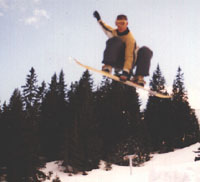 Miljan is the only snowboard instructor there. He never rode anywhere outside of the 'Serbian lands' - but he learned a lot just watching videos. I helped him build a kicker and took some pictures of his excellent front-flips and 540s. On my return leg I visited my mom in Germany. So I had the KLM flight from Munich to Amsterdam and from there a connecting KLM flight to New York. The flight from Munich was two and a half hours late, because of snow-storm at Schiphol - but the snow-storm did not prevent the flight to New York to leave. The assholes from KLM booked me a flight for the next morning but refused to pay accommodation for the night.
Miljan is the only snowboard instructor there. He never rode anywhere outside of the 'Serbian lands' - but he learned a lot just watching videos. I helped him build a kicker and took some pictures of his excellent front-flips and 540s. On my return leg I visited my mom in Germany. So I had the KLM flight from Munich to Amsterdam and from there a connecting KLM flight to New York. The flight from Munich was two and a half hours late, because of snow-storm at Schiphol - but the snow-storm did not prevent the flight to New York to leave. The assholes from KLM booked me a flight for the next morning but refused to pay accommodation for the night.
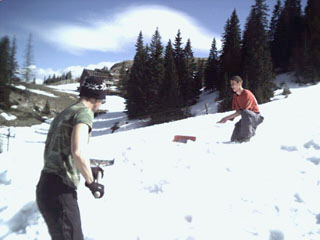 So I was stuck at the Amsterdam airport at 10 pm, with very little money and after a quite exhausting bus trip through Bosnia and a night train from Croatia to Germany. Then I realized that I only have e-mail addresses and no telephone numbers of my friends in Amsterdam, which sucked, since I
couldn't reach them. I even called xs4all but only got the voice mail. I didn't want to pay nlg 150 for a bed at airport, but I also didn't want to sleep on the bench - and after all, it is kind of a blasphemy to sleep at a mundane international airport while in Amsterdam. I took a train to the city and a tram down Voorburgwal and asked the driver to stop at the first 'youth hostel' sign in sight - they were full for the night, but the guy sent me around the corner to the Tourist Inn on Spuistraat, where I got a bed for nlg 50.
So I was stuck at the Amsterdam airport at 10 pm, with very little money and after a quite exhausting bus trip through Bosnia and a night train from Croatia to Germany. Then I realized that I only have e-mail addresses and no telephone numbers of my friends in Amsterdam, which sucked, since I
couldn't reach them. I even called xs4all but only got the voice mail. I didn't want to pay nlg 150 for a bed at airport, but I also didn't want to sleep on the bench - and after all, it is kind of a blasphemy to sleep at a mundane international airport while in Amsterdam. I took a train to the city and a tram down Voorburgwal and asked the driver to stop at the first 'youth hostel' sign in sight - they were full for the night, but the guy sent me around the corner to the Tourist Inn on Spuistraat, where I got a bed for nlg 50.
I immediately understood that I am close to the red light district - i even remembered, although it was 15 years ago when I was last time here, and I was mostly baked then - how to get to the coffee-shops on the 'right' side of Damrak. Nothing changed - Damrak area at 1 am looks positively scarier then Harlem in New York city - perhaps because the streets are narrower - good that I look like a homegrown in such neighborhoods, so everybody thinks I am a local. For the next nlg 50 I got some Dutch souvenirs that were unavailable at the Schiphol, and I still saved nlg 50! Being a real pimp I managed to take them all the way to my friends in Vermont.
The night receptionist at the Tourist Inn was an interesting character: Irfan is a young man from Afghanistan that got an asylum in Netherlands - he was telling me nostalgic stories about Russian occupation - he liked Russians - he is from an urban family from Kabul (they are all in exile now) and he even got a scholarship to go to college in St. Petersburg (which was revoked when the war started...); he hates Taliban, about as much as people from Sarajevo hate the Serb ogres that shelled their city from the surrounding mountains. In any case I decided not to sue KLM, because after all, I did have good time in Amsterdam.
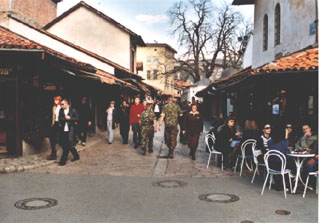 The destruction of Tetovo served as a backdrop to my entire trip through the region. This is essentially about a group of smugglers, that triggered a war dissatisfied when their smuggling routes got closed. The
context is familiar to a Balkan observer: the appearance of the well armed group, the latent, prejudicial, FEAR on the both sides that something terrible will happen, the over-reaction in use of force by the majority population, the exaggeration in the media, the taking over of the political stage by the most radical elements, the indiscriminate killings committed by all warring parties and the usual suicidal concepts of a typical Balkan conflagration. Where will it stop (if it will stop)?
The destruction of Tetovo served as a backdrop to my entire trip through the region. This is essentially about a group of smugglers, that triggered a war dissatisfied when their smuggling routes got closed. The
context is familiar to a Balkan observer: the appearance of the well armed group, the latent, prejudicial, FEAR on the both sides that something terrible will happen, the over-reaction in use of force by the majority population, the exaggeration in the media, the taking over of the political stage by the most radical elements, the indiscriminate killings committed by all warring parties and the usual suicidal concepts of a typical Balkan conflagration. Where will it stop (if it will stop)?
KLA fighters, once armed and supported by the U.S. in their fight against Milosevic’s Serbia’s oppression, now turned on peaceful Macedonia in their newly found bid for aggrandizement of their ethnic space. Here is yet another example of how the road to hell is always paved by the (US) good intentions - the US empowered Yugoslavia to oppress Albanians, then it armed Albanians to fight that oppression, and now they attack and kill innocents; the US empowered Iraq to win the war against Iran, only to have to chase Iraq’s Republican Guard out of Kuwait later; the US enabled Afghan mujahedeen win the war against Russians, and now those victorious ‘liberators’ keep women in a perennial prison, blow up statues of Buddha and shelter the America’s most wanted terrorist, Osama Bin Laden.
Mihalj Kertes, former Yugoslav customs chief official under Milosevic, is now in prison. In his first court deposition, he said that, with the money stolen from Serbian people, among other things, a gold necklace for Madame Madeleine Albright was bought. The money was also, he said, regularly deposited to Credit Suisse's good old boy, Richard Holbrooke's off-shore account: as he would receive the money he'd work on postponing the bombing campaign. Kertes is working hard on making himself and his boss, Milosevic, look more as patriots than as thieves. In the process he definitely made Holbrooke look like a piece of corrupt shit. I am dying to hear Dick's defense.
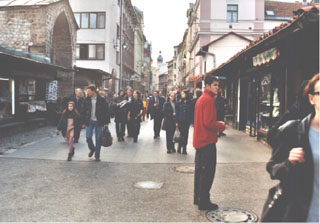 KLA’s actions are not surprising - after all why would they be more civilized than their Serb or Croat counterparts? But why all those nasty wars have to be fought in ski-resorts? War in Bosnia destroyed the 1984 Winter Olympics mountain resort at Bjelasnica: the mountain is just recently de-mined, all amenities except for one renovated hotel are still destroyed, there is only one chairlift operating - and that one does not go to the top of the mountain. With no snow-making, this year, which was marked by an unusually mild winter in Europe, there was only some snow at the top of Bjelasnica, where there was no lift service, so the mountain stayed close for the winter. War in Kosovo destroyed the resort at Brezovica - the sickest run in the Balkans according to a group of French riders that visited it before the destruction. And the war in Macedonia is fought on Sarplanina, the mountain overlooking Tetovo, that on the good year may be buried under 30 ft of freshies.
KLA’s actions are not surprising - after all why would they be more civilized than their Serb or Croat counterparts? But why all those nasty wars have to be fought in ski-resorts? War in Bosnia destroyed the 1984 Winter Olympics mountain resort at Bjelasnica: the mountain is just recently de-mined, all amenities except for one renovated hotel are still destroyed, there is only one chairlift operating - and that one does not go to the top of the mountain. With no snow-making, this year, which was marked by an unusually mild winter in Europe, there was only some snow at the top of Bjelasnica, where there was no lift service, so the mountain stayed close for the winter. War in Kosovo destroyed the resort at Brezovica - the sickest run in the Balkans according to a group of French riders that visited it before the destruction. And the war in Macedonia is fought on Sarplanina, the mountain overlooking Tetovo, that on the good year may be buried under 30 ft of freshies.
The construction of Bosnia is a relieving contrast to the current destruction of Macedonia. The entire Bosnia looks like a big construction site: cranes are everywhere. Yet the closer look at those developments is not that encouraging. It is quite obvious which ethnic group is in power in which township in Bosnia. If you see the Federation flag flying, signs both in Roman and Cyrillic letters and shining brand new mosque, you may be sure that there Bosnian Muslims are the majority. If the signs are only in Roman letters, the mosque is old and dilapidated, yet the church is new and grandiose and the Croatian flag is flying instead of the Federation one - you are in the Croatian territory. And if the signs are only in Cyrillic letters, the church is newly renovated, the mosque is generally not in sight, and only the Serbian flag is flying, you are in the Republika Srpska land.
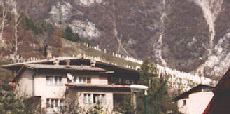 To get to Zagreb from Sarajevo by bus, a 200 miles distance, it takes more than 8 hours. The roads are slow, narrow, winding, in disrepair and there are even speed-bumps on major highways that pass right through every single hamlet on the way. Vermont’s Route 100 comes to mind. The nature is breath-taking - Oregonian climate and landscape with deep canyons, plenty of whitewater, dense oak and pine forests, steep, barren mountains. Unlike in the downtown Sarajevo, where the war already seems to have happened in the past, and where the few ruins are carefully preserved in the city as the memento, on the outskirts and as you go deeper to the countryside, the destruction and devastation is more present, small cities, where all public grounds are white with grave stones, houses burned, demolished and ruins defiled with graffiti painted slanders.
To get to Zagreb from Sarajevo by bus, a 200 miles distance, it takes more than 8 hours. The roads are slow, narrow, winding, in disrepair and there are even speed-bumps on major highways that pass right through every single hamlet on the way. Vermont’s Route 100 comes to mind. The nature is breath-taking - Oregonian climate and landscape with deep canyons, plenty of whitewater, dense oak and pine forests, steep, barren mountains. Unlike in the downtown Sarajevo, where the war already seems to have happened in the past, and where the few ruins are carefully preserved in the city as the memento, on the outskirts and as you go deeper to the countryside, the destruction and devastation is more present, small cities, where all public grounds are white with grave stones, houses burned, demolished and ruins defiled with graffiti painted slanders.
The villages on the way live from being on the way. With no railroads operating, travelers are forced to travail the treacherous narrow roads, so the restaurants, souvenir shops, stores spring up everywhere along the road. Particularly eye-piercing are gas stations: it seems that each little hamlet has its own company or two. There is wide suspicion that such an unbelievable proliferation of gas distribution companies is due to the warlord’s money laundering. Every former warlord has his own gas station’s chain. Oil was always a good business to be in.  People live in half-build new houses, or half-destroyed old houses, but there is a satellite dish on each one of them, reflecting the order of priorities. New houses are mostly found in the Croatian-held parts. Big, brand new mansions, some of them still completely empty, like modern ghost inhabited castles built from concrete, line the road from Sarajevo to Travnik in Croatian controlled central Bosnia. As by an unwritten rule, big trucks, tractor-trailers, most of the time, are parked in front of those palaces, with German lettering on their tarpaulins, signaling the origins of the wealth: the returning ‘gastarbeiter’ phenomenon.
People live in half-build new houses, or half-destroyed old houses, but there is a satellite dish on each one of them, reflecting the order of priorities. New houses are mostly found in the Croatian-held parts. Big, brand new mansions, some of them still completely empty, like modern ghost inhabited castles built from concrete, line the road from Sarajevo to Travnik in Croatian controlled central Bosnia. As by an unwritten rule, big trucks, tractor-trailers, most of the time, are parked in front of those palaces, with German lettering on their tarpaulins, signaling the origins of the wealth: the returning ‘gastarbeiter’ phenomenon.
Since the early sixties - when former Yugoslavia opened its borders - people were leaving, mostly poor, poorly educated, from backward, jobless regions, often members of ethnic minority groups: they were leaving for Germany, that needed workers for its rapidly growing economy. 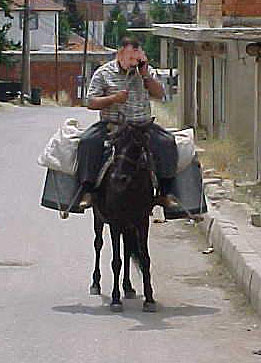 Many of those people earned decent money in past four decades and with never becoming a part of the Western consumerist culture, they saved it. They saved it with one thing in mind: to go back to their little hamlet and build a disproportionately big residence there, park all their toys in front of it, so neighbors can see the markings of their success. The war messed up with those plans for a while, but the war is over now, and they are back with their money, which now is the only money in the region available on the side of the foreign aid. They can buy a lot of political influence with that money. Railroad tracks are repaired for some time now, and there were about ten test trains already from Zagreb to Sarajevo. Still, the regular line is not opened yet. Undefined dangers and technical difficulties are cited. In reality, the railway transport, controlled from Sarajevo and Zagreb, would be a serious, possibly disastrous blow to the grey economy that sprung around the narrow Bosnian roads: the special interests of trucking business, gas stations business, restaurants, shops, motels would be seriously hurt. Therefore it comes hardly as a surprise that Croatian lobby opposes railroads. And there also can be no surprise that both Sarajevo and Zagreb are losing patience with Croatian lobby in Bosnia.
Many of those people earned decent money in past four decades and with never becoming a part of the Western consumerist culture, they saved it. They saved it with one thing in mind: to go back to their little hamlet and build a disproportionately big residence there, park all their toys in front of it, so neighbors can see the markings of their success. The war messed up with those plans for a while, but the war is over now, and they are back with their money, which now is the only money in the region available on the side of the foreign aid. They can buy a lot of political influence with that money. Railroad tracks are repaired for some time now, and there were about ten test trains already from Zagreb to Sarajevo. Still, the regular line is not opened yet. Undefined dangers and technical difficulties are cited. In reality, the railway transport, controlled from Sarajevo and Zagreb, would be a serious, possibly disastrous blow to the grey economy that sprung around the narrow Bosnian roads: the special interests of trucking business, gas stations business, restaurants, shops, motels would be seriously hurt. Therefore it comes hardly as a surprise that Croatian lobby opposes railroads. And there also can be no surprise that both Sarajevo and Zagreb are losing patience with Croatian lobby in Bosnia.
The situation of Bosnian Croats is, of course, not that simple. Not all of them are rich. And the hatred against them both in Bosnia and in Croatia is generalized. A woman that I met on the bus, a Croat from Tomislavgrad who lives in Berlin for past fifteen years, told me that she rather spoke German than Croatian in Zagreb fearing that she would be despised, ostracized or worse because of her accent. Yet, a bomb that exploded in downtown Zagreb destroying five cars, while I was in Sarajevo, will most definitely not help Bosnian Croat popularity there. The main eyewitness, a heroin addict and a former fighter in Croatia vs. Yugoslavia war, was arrested practically immediately. But the wide perception is that he scapegoated himself, and that really beyond the explosion is the right wing faction in the military, which has its roots and interests in the Croatian controlled Bosnia. Their public leader there, Ante Jelavic, was recently ousted by the Bosnia’s real administrator, high representative Wolfgang Petritsch. Following that ouster, many Croat parts of Federation declared autonomy, and Croatian military officers walked out of the Federal armed forces, creating the most serious crisis in the post-Dayton Bosnia. Yet, I don’t believe we should perceive this walk-out as a potential renewal of armed hostilities in Bosnia: Bosnia is thoroughly policed by half a dozen Western armies: French, Brits, Dutch, Italians, Americans... - and they are the real power in charge there: international forces.
The spokesman for Gradjanska Demokratska Stranka (Citizens Democratic Party, part of the ruling coalition), a moderate, Sarajevo born and bred Croat, Ivica Pijanic, gave me a slightly different angle - angle that to certain point justifies Jelavic’s anger with the Federation: there are constitutional problems with the electoral law in the federation: according to the new law, in the ‘house of peoples’ all ethnic groups vote for all ethnic candidates (with the old law each ethnic group voted for their candidates): this allows majority population (Bosniak / Bosnian Muslim) to elect all candidates (including Croatian) to its liking even in that house, which was supposed to offset the injustice to the one-man-one-vote principle in the ‘house of commons’, in a way US Senate does in regards to the House of Representatives. This becomes particularly important in the situation with unequally numbered constitutive peoples like it is in the Bosnian-Croat federation in Bosnia - that’s essentially why Jelavic enjoys wide support in Croatian parts of Bosnia. This support rises particularly with the feeling that Serbs in Bosnia were given virtually their own state by the Dayton agreement.
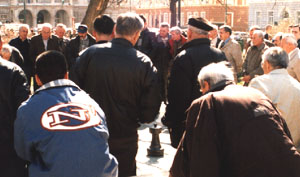 The overall economic situation in Bosnia is bad. If you stand on the street in Sarajevo for more than a minute somebody will approach you asking for money. If you sit outside in a café, like everybody seems to be doing these days, kind of trying to make up for years of having to hide in basements, kids mingling among the café tables, will approach you asking for money. I don’t know the exact unemployment figures, but they must be fairly high, I gathered. With the exception of the secondary highway robbery economy, described in previous paragraphs, there is just a few factories in Bosnia still standing: and they are generally in the North-West part. Republika Srpska region around Banja Luka, for example, did not see any destruction through the war, and it witnesses relatively speedy recovery with the special trade status that Yugoslav president Kostunica awarded to Republika Srpska. The only thing I noticed out of sync there was this clock that shows different times on each side. Hydro-power plants and related steel mills around Jajce are fully operational, too. And in Croatian hands. The economy of Sarajevo is reduced to financial management of foreign aid disbursements. This is a lucrative job for those who work in the ‘field’, but detrimental for developing of Bosnia as a self-sustaining economy. For example: KM - the convertible mark, Bosnian currency, is artificially tied to DM - this fiscal stability is created for the benefit of the foreign overseers, and in the event of their withdrawal, it would disappear, rapidly plunging Bosnian economy back to the abyss of war. This gives rise to the un-self-reliance. I witnessed a lot of "we suffered, therefore now we have to be supported for the rest of our lives" on the part of Bosnians, and a lot of "Bosnians are not competent to do anything without us" on the part of ‘internationals’ in charge there. The situation is best understood in lieu of the term ‘neopatrimonialism’ as described by Bertrand Badie in "The Imported State": Neopatrimonialism stems, in effect, from the paucity of internal resources available to the political system, relative to the abundance of external resources. And this, precisely, is where Bosnia is at today.
The overall economic situation in Bosnia is bad. If you stand on the street in Sarajevo for more than a minute somebody will approach you asking for money. If you sit outside in a café, like everybody seems to be doing these days, kind of trying to make up for years of having to hide in basements, kids mingling among the café tables, will approach you asking for money. I don’t know the exact unemployment figures, but they must be fairly high, I gathered. With the exception of the secondary highway robbery economy, described in previous paragraphs, there is just a few factories in Bosnia still standing: and they are generally in the North-West part. Republika Srpska region around Banja Luka, for example, did not see any destruction through the war, and it witnesses relatively speedy recovery with the special trade status that Yugoslav president Kostunica awarded to Republika Srpska. The only thing I noticed out of sync there was this clock that shows different times on each side. Hydro-power plants and related steel mills around Jajce are fully operational, too. And in Croatian hands. The economy of Sarajevo is reduced to financial management of foreign aid disbursements. This is a lucrative job for those who work in the ‘field’, but detrimental for developing of Bosnia as a self-sustaining economy. For example: KM - the convertible mark, Bosnian currency, is artificially tied to DM - this fiscal stability is created for the benefit of the foreign overseers, and in the event of their withdrawal, it would disappear, rapidly plunging Bosnian economy back to the abyss of war. This gives rise to the un-self-reliance. I witnessed a lot of "we suffered, therefore now we have to be supported for the rest of our lives" on the part of Bosnians, and a lot of "Bosnians are not competent to do anything without us" on the part of ‘internationals’ in charge there. The situation is best understood in lieu of the term ‘neopatrimonialism’ as described by Bertrand Badie in "The Imported State": Neopatrimonialism stems, in effect, from the paucity of internal resources available to the political system, relative to the abundance of external resources. And this, precisely, is where Bosnia is at today.
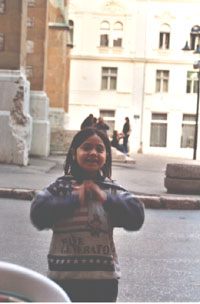 The civil society, too, suffers because of the full dependency on foreigners. However, that dependency is often enforced by the local laws. For example, law in Croatia requires that boards of directors of local foundations have to be approved by the state, but the state body, that should be dealing with such approvals, was never established. The direct consequence is that no local foundations can be formed and that all local non-governmental organizations are forced to depend on foreign aid. Of course, Bosnia has a similar situation. That leaves local governments with free hands to accuse local non-governmental organizations of being the ‘fifth column,’ whenever they choose so. Furthermore, that contributes to ill popularity of those non-governmental organizations in local independent media. The journalist take on NGO-s is that those organizations are full of well paid do-nothings, who managed to sweet-talk Western foundations into paying them handsomely for writing erudite, yet useless, needless and pointless reports. The devaluation of local NGO-s standing is also partially due to their general fault to self-police themselves: not only are the cases of embezzlement and money mis-management often, but also there are more serious deviations - like when it was discovered that the community facilitator in Ilidza was an officer in Republika Srpska army on positions around Sarajevo during the war - or like when it was discovered that the community facilitator in Visegrad was giving confidential OSCE information to the Republika Srpska government.
The civil society, too, suffers because of the full dependency on foreigners. However, that dependency is often enforced by the local laws. For example, law in Croatia requires that boards of directors of local foundations have to be approved by the state, but the state body, that should be dealing with such approvals, was never established. The direct consequence is that no local foundations can be formed and that all local non-governmental organizations are forced to depend on foreign aid. Of course, Bosnia has a similar situation. That leaves local governments with free hands to accuse local non-governmental organizations of being the ‘fifth column,’ whenever they choose so. Furthermore, that contributes to ill popularity of those non-governmental organizations in local independent media. The journalist take on NGO-s is that those organizations are full of well paid do-nothings, who managed to sweet-talk Western foundations into paying them handsomely for writing erudite, yet useless, needless and pointless reports. The devaluation of local NGO-s standing is also partially due to their general fault to self-police themselves: not only are the cases of embezzlement and money mis-management often, but also there are more serious deviations - like when it was discovered that the community facilitator in Ilidza was an officer in Republika Srpska army on positions around Sarajevo during the war - or like when it was discovered that the community facilitator in Visegrad was giving confidential OSCE information to the Republika Srpska government.
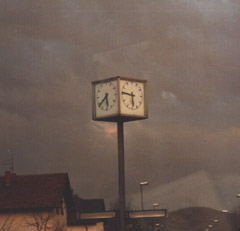 As I said, the roads are terrible, but the border crossings, hence, are brand new and very modern. It seems that a lot of architectural savvy was invested in that first presentation that a sovereign state has to the outside world. Fifteen years ago I had to show my passport between Germany and Austria and between Italy and France. Today there are no borders there. But I have to show my passport between Bosnia and Croatia. There is that old nonsensical law imported from former Yugoslavia, still on the books in Bosnia, that foreign citizens need to register with police if visiting Bosnia for more than 24 hours. This is usually handled by a hotel, but I didn’t stay in one. And I didn’t know exactly when I’d leave. And I do not see Bosnia as being a foreign country for me. Yet the Republika Srpska border policemen at the imposing, freshly built Gradiska border-crossing, was of a different opinion: a Croat, born in Germany, that resides in the U.S., geee, he must be a spy for at least one of those countries, could it possibly be any different? As he ordered me off the bus, the American college students - the bus, both ways, was full of young Americans that decided for a little war tourism during their Spring break - that I met on the bus, offered to take e-mail addresses of my friends and notify them of my fate, and the bus driver, an old, weathered, round gentleman, approached me with the suggestion to give 10 Deutschmarks to the policeman. "That usually works," he said, unmoved by the fact that the policeman could clearly hear and, since Croatian and Serbian are, well, the same language, understand him. Obviously ashamed, the policeman returned my passport and sent me back on the bus, without taking the customary ‘service fee.’
As I said, the roads are terrible, but the border crossings, hence, are brand new and very modern. It seems that a lot of architectural savvy was invested in that first presentation that a sovereign state has to the outside world. Fifteen years ago I had to show my passport between Germany and Austria and between Italy and France. Today there are no borders there. But I have to show my passport between Bosnia and Croatia. There is that old nonsensical law imported from former Yugoslavia, still on the books in Bosnia, that foreign citizens need to register with police if visiting Bosnia for more than 24 hours. This is usually handled by a hotel, but I didn’t stay in one. And I didn’t know exactly when I’d leave. And I do not see Bosnia as being a foreign country for me. Yet the Republika Srpska border policemen at the imposing, freshly built Gradiska border-crossing, was of a different opinion: a Croat, born in Germany, that resides in the U.S., geee, he must be a spy for at least one of those countries, could it possibly be any different? As he ordered me off the bus, the American college students - the bus, both ways, was full of young Americans that decided for a little war tourism during their Spring break - that I met on the bus, offered to take e-mail addresses of my friends and notify them of my fate, and the bus driver, an old, weathered, round gentleman, approached me with the suggestion to give 10 Deutschmarks to the policeman. "That usually works," he said, unmoved by the fact that the policeman could clearly hear and, since Croatian and Serbian are, well, the same language, understand him. Obviously ashamed, the policeman returned my passport and sent me back on the bus, without taking the customary ‘service fee.’
The corruption and associated rip-offs are another great problem of Bosnia (as they are of any society that largely depends on external resources). For example, when I was late for the bus, I tried to see how much it would cost me to rent a car to Zagreb. The most amusing offer was the one I got from AVIS: I could get a car, but only the biggest in the line was available on such a short notice, and the drop-off fee would be $300 - 8 times the daily rate. The alternative, AVIS salesperson suggested (and obviously liked more) was to give me the same car with a driver, in which case there would be no drop-off fee, but I’d have to pay for all costs in both directions - in the end it would cost me just a slightly more than a cab ride, and just a slightly less than exaggeratedly overpriced round-trip airplane ride to Zagreb. Particularly telling was that all prices were in dollars - despite that everybody in Bosnia operates in German marks. The best offer I got was from the F * Rent-a-Car Sarajevo, a small, yet seemingly professionally run, honest outfit that I rented a car from for my trip to Jahorina two days earlier. Still, of course, I traveled the next morning by bus.

 Miljan is the only snowboard instructor there. He never rode anywhere outside of the 'Serbian lands' - but he learned a lot just watching videos. I helped him build a kicker and took some pictures of his excellent front-flips and 540s. On my return leg I visited my mom in Germany. So I had the KLM flight from Munich to Amsterdam and from there a connecting KLM flight to New York. The flight from Munich was two and a half hours late, because of snow-storm at Schiphol - but the snow-storm did not prevent the flight to New York to leave. The assholes from KLM booked me a flight for the next morning but refused to pay accommodation for the night.
Miljan is the only snowboard instructor there. He never rode anywhere outside of the 'Serbian lands' - but he learned a lot just watching videos. I helped him build a kicker and took some pictures of his excellent front-flips and 540s. On my return leg I visited my mom in Germany. So I had the KLM flight from Munich to Amsterdam and from there a connecting KLM flight to New York. The flight from Munich was two and a half hours late, because of snow-storm at Schiphol - but the snow-storm did not prevent the flight to New York to leave. The assholes from KLM booked me a flight for the next morning but refused to pay accommodation for the night.
 While I am writing this, China still holds 24 American spies as hostages in its ever more aggressive bid to establish a new cold war like bipolarity in the U.S. dominated world. Chinese media analysts scout the world’s media for articles that lean towards accepting their government’s demands for an American apology. Their reporters are sent to Pakistan, Jordan and Egypt to collect statements from ordinary people in the streets demanding American apology. China re-iterated its strong support for the U.N. - an organization that several consequent U.S. administrations saw as nuisance in the way of their foreign policy. Germany announced how China expressed its support for the Kyoto agreement on greenhouse gases reduction - thus leaving the U.S. as a sole large industrialized nation opposing it. Reduction of greenhouse gases would demand curbing energy use and that is perceived as a direct threat to the American way of life by the certain SUV-owning nation.
While I am writing this, China still holds 24 American spies as hostages in its ever more aggressive bid to establish a new cold war like bipolarity in the U.S. dominated world. Chinese media analysts scout the world’s media for articles that lean towards accepting their government’s demands for an American apology. Their reporters are sent to Pakistan, Jordan and Egypt to collect statements from ordinary people in the streets demanding American apology. China re-iterated its strong support for the U.N. - an organization that several consequent U.S. administrations saw as nuisance in the way of their foreign policy. Germany announced how China expressed its support for the Kyoto agreement on greenhouse gases reduction - thus leaving the U.S. as a sole large industrialized nation opposing it. Reduction of greenhouse gases would demand curbing energy use and that is perceived as a direct threat to the American way of life by the certain SUV-owning nation.
 So I was stuck at the Amsterdam airport at 10 pm, with very little money and after a quite exhausting bus trip through Bosnia and a night train from Croatia to Germany. Then I realized that I only have e-mail addresses and no telephone numbers of my friends in Amsterdam, which sucked, since I
couldn't reach them. I even called xs4all but only got the voice mail. I didn't want to pay nlg 150 for a bed at airport, but I also didn't want to sleep on the bench - and after all, it is kind of a blasphemy to sleep at a mundane international airport while in Amsterdam. I took a train to the city and a tram down Voorburgwal and asked the driver to stop at the first 'youth hostel' sign in sight - they were full for the night, but the guy sent me around the corner to the Tourist Inn on Spuistraat, where I got a bed for nlg 50.
So I was stuck at the Amsterdam airport at 10 pm, with very little money and after a quite exhausting bus trip through Bosnia and a night train from Croatia to Germany. Then I realized that I only have e-mail addresses and no telephone numbers of my friends in Amsterdam, which sucked, since I
couldn't reach them. I even called xs4all but only got the voice mail. I didn't want to pay nlg 150 for a bed at airport, but I also didn't want to sleep on the bench - and after all, it is kind of a blasphemy to sleep at a mundane international airport while in Amsterdam. I took a train to the city and a tram down Voorburgwal and asked the driver to stop at the first 'youth hostel' sign in sight - they were full for the night, but the guy sent me around the corner to the Tourist Inn on Spuistraat, where I got a bed for nlg 50.
 The
The  KLA’s actions are not surprising - after all why would they be more civilized than their Serb or Croat counterparts? But why all those nasty wars have to be fought in ski-resorts? War in Bosnia destroyed the
KLA’s actions are not surprising - after all why would they be more civilized than their Serb or Croat counterparts? But why all those nasty wars have to be fought in ski-resorts? War in Bosnia destroyed the  To get to
To get to  People live in half-build new houses, or half-destroyed old houses, but there is a satellite dish on each one of them, reflecting the order of priorities. New houses are mostly found in the Croatian-held parts. Big, brand new mansions, some of them still completely empty, like modern ghost inhabited castles built from concrete, line the road from Sarajevo to Travnik in Croatian controlled central Bosnia. As by an unwritten rule, big trucks, tractor-trailers, most of the time, are parked in front of those palaces, with German lettering on their tarpaulins, signaling the origins of the wealth: the returning ‘gastarbeiter’ phenomenon.
People live in half-build new houses, or half-destroyed old houses, but there is a satellite dish on each one of them, reflecting the order of priorities. New houses are mostly found in the Croatian-held parts. Big, brand new mansions, some of them still completely empty, like modern ghost inhabited castles built from concrete, line the road from Sarajevo to Travnik in Croatian controlled central Bosnia. As by an unwritten rule, big trucks, tractor-trailers, most of the time, are parked in front of those palaces, with German lettering on their tarpaulins, signaling the origins of the wealth: the returning ‘gastarbeiter’ phenomenon.
 Many of those people earned decent money in past four decades and with never becoming a part of the Western consumerist culture, they saved it. They saved it with one thing in mind: to go back to their little hamlet and build a disproportionately big residence there, park all their toys in front of it, so neighbors can see the markings of their success. The war messed up with those plans for a while, but the war is over now, and they are back with their money, which now is the only money in the region available on the side of the foreign aid. They can buy a lot of political influence with that money. Railroad tracks are repaired for some time now, and there were about ten test trains already from Zagreb to Sarajevo. Still, the regular line is not opened yet. Undefined dangers and technical difficulties are cited. In reality, the railway transport, controlled from Sarajevo and Zagreb, would be a serious, possibly disastrous blow to the grey economy that sprung around the narrow Bosnian roads: the special interests of trucking business, gas stations business, restaurants, shops, motels would be seriously hurt. Therefore it comes hardly as a surprise that Croatian lobby opposes railroads. And there also can be no surprise that both Sarajevo and Zagreb are losing patience with Croatian lobby in Bosnia.
Many of those people earned decent money in past four decades and with never becoming a part of the Western consumerist culture, they saved it. They saved it with one thing in mind: to go back to their little hamlet and build a disproportionately big residence there, park all their toys in front of it, so neighbors can see the markings of their success. The war messed up with those plans for a while, but the war is over now, and they are back with their money, which now is the only money in the region available on the side of the foreign aid. They can buy a lot of political influence with that money. Railroad tracks are repaired for some time now, and there were about ten test trains already from Zagreb to Sarajevo. Still, the regular line is not opened yet. Undefined dangers and technical difficulties are cited. In reality, the railway transport, controlled from Sarajevo and Zagreb, would be a serious, possibly disastrous blow to the grey economy that sprung around the narrow Bosnian roads: the special interests of trucking business, gas stations business, restaurants, shops, motels would be seriously hurt. Therefore it comes hardly as a surprise that Croatian lobby opposes railroads. And there also can be no surprise that both Sarajevo and Zagreb are losing patience with Croatian lobby in Bosnia.
 The overall economic situation in Bosnia is bad. If you stand on the street in Sarajevo for more than a minute somebody will approach you asking for money. If you sit outside in a café, like everybody seems to be doing these days, kind of trying to make up for years of having to hide in basements, kids mingling among the café tables, will approach you asking for money. I don’t know the exact unemployment figures, but they must be fairly high, I gathered. With the exception of the secondary highway robbery economy, described in previous paragraphs, there is just a few factories in Bosnia still standing: and they are generally in the North-West part. Republika Srpska region around
The overall economic situation in Bosnia is bad. If you stand on the street in Sarajevo for more than a minute somebody will approach you asking for money. If you sit outside in a café, like everybody seems to be doing these days, kind of trying to make up for years of having to hide in basements, kids mingling among the café tables, will approach you asking for money. I don’t know the exact unemployment figures, but they must be fairly high, I gathered. With the exception of the secondary highway robbery economy, described in previous paragraphs, there is just a few factories in Bosnia still standing: and they are generally in the North-West part. Republika Srpska region around  The civil society, too, suffers because of the full dependency on foreigners. However, that dependency is often enforced by the local laws. For example, law in Croatia requires that boards of directors of local foundations have to be approved by the state, but the state body, that should be dealing with such approvals, was never established. The direct consequence is that no local foundations can be formed and that all local non-governmental organizations are forced to depend on foreign aid. Of course, Bosnia has a similar situation. That leaves local governments with free hands to accuse local non-governmental organizations of being the ‘fifth column,’ whenever they choose so. Furthermore, that contributes to ill popularity of those non-governmental organizations in local independent media. The journalist take on NGO-s is that those organizations are full of well paid do-nothings, who managed to sweet-talk Western foundations into paying them handsomely for writing erudite, yet useless, needless and pointless reports. The devaluation of local NGO-s standing is also partially due to their general fault to self-police themselves: not only are the cases of embezzlement and money mis-management often, but also there are more serious deviations - like when it was discovered that the community facilitator in Ilidza was an officer in Republika Srpska army on positions around Sarajevo during the war - or like when it was discovered that the community facilitator in Visegrad was giving confidential OSCE information to the Republika Srpska government.
The civil society, too, suffers because of the full dependency on foreigners. However, that dependency is often enforced by the local laws. For example, law in Croatia requires that boards of directors of local foundations have to be approved by the state, but the state body, that should be dealing with such approvals, was never established. The direct consequence is that no local foundations can be formed and that all local non-governmental organizations are forced to depend on foreign aid. Of course, Bosnia has a similar situation. That leaves local governments with free hands to accuse local non-governmental organizations of being the ‘fifth column,’ whenever they choose so. Furthermore, that contributes to ill popularity of those non-governmental organizations in local independent media. The journalist take on NGO-s is that those organizations are full of well paid do-nothings, who managed to sweet-talk Western foundations into paying them handsomely for writing erudite, yet useless, needless and pointless reports. The devaluation of local NGO-s standing is also partially due to their general fault to self-police themselves: not only are the cases of embezzlement and money mis-management often, but also there are more serious deviations - like when it was discovered that the community facilitator in Ilidza was an officer in Republika Srpska army on positions around Sarajevo during the war - or like when it was discovered that the community facilitator in Visegrad was giving confidential OSCE information to the Republika Srpska government.
 As I said, the roads are terrible, but the border crossings, hence, are brand new and very modern. It seems that a lot of architectural savvy was invested in that first presentation that a sovereign state has to the outside world. Fifteen years ago I had to show my passport between Germany and Austria and between Italy and France. Today there are no borders there. But I have to show my passport between Bosnia and Croatia. There is that old nonsensical law imported from former Yugoslavia, still on the books in Bosnia, that foreign citizens need to register with police if visiting Bosnia for more than 24 hours. This is usually handled by a hotel, but I didn’t stay in one. And I didn’t know exactly when I’d leave. And I do not see Bosnia as being a foreign country for me. Yet the Republika Srpska border policemen at the imposing, freshly built Gradiska border-crossing, was of a different opinion: a Croat, born in Germany, that resides in the U.S., geee, he must be a spy for at least one of those countries, could it possibly be any different? As he ordered me off the bus, the American college students - the bus, both ways, was full of young Americans that decided for a little war tourism during their Spring break - that I met on the bus, offered to take e-mail addresses of my friends and notify them of my fate, and the bus driver, an old, weathered, round gentleman, approached me with the suggestion to give 10 Deutschmarks to the policeman. "That usually works," he said, unmoved by the fact that the policeman could clearly hear and, since Croatian and Serbian are, well, the same language, understand him. Obviously ashamed, the policeman returned my passport and sent me back on the bus, without taking the customary ‘service fee.’
As I said, the roads are terrible, but the border crossings, hence, are brand new and very modern. It seems that a lot of architectural savvy was invested in that first presentation that a sovereign state has to the outside world. Fifteen years ago I had to show my passport between Germany and Austria and between Italy and France. Today there are no borders there. But I have to show my passport between Bosnia and Croatia. There is that old nonsensical law imported from former Yugoslavia, still on the books in Bosnia, that foreign citizens need to register with police if visiting Bosnia for more than 24 hours. This is usually handled by a hotel, but I didn’t stay in one. And I didn’t know exactly when I’d leave. And I do not see Bosnia as being a foreign country for me. Yet the Republika Srpska border policemen at the imposing, freshly built Gradiska border-crossing, was of a different opinion: a Croat, born in Germany, that resides in the U.S., geee, he must be a spy for at least one of those countries, could it possibly be any different? As he ordered me off the bus, the American college students - the bus, both ways, was full of young Americans that decided for a little war tourism during their Spring break - that I met on the bus, offered to take e-mail addresses of my friends and notify them of my fate, and the bus driver, an old, weathered, round gentleman, approached me with the suggestion to give 10 Deutschmarks to the policeman. "That usually works," he said, unmoved by the fact that the policeman could clearly hear and, since Croatian and Serbian are, well, the same language, understand him. Obviously ashamed, the policeman returned my passport and sent me back on the bus, without taking the customary ‘service fee.’
